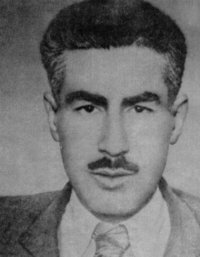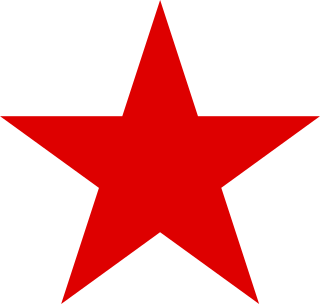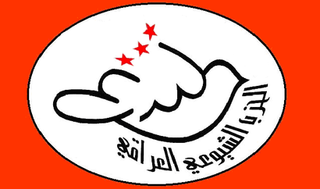
Leninism is the political theory for the organisation of a revolutionary vanguard party and the achievement of a dictatorship of the proletariat as political prelude to the establishment of socialism. Developed by and named for the Russian revolutionary Vladimir Lenin, Leninism comprises socialist political and economic theories, developed from Marxism and Lenin's interpretations of Marxist theories, for practical application to the socio-political conditions of the Russian Empire of the early 20th century.

General Secretary of the Central Committee of the Communist Party of the Soviet Union was an office of the Communist Party of the Soviet Union (CPSU) that by the late 1920s had evolved into the most powerful of the Central Committee's various secretaries. With a few exceptions, from 1929 until the union's dissolution the holder of the office was the de facto leader of the Soviet Union, because the post controlled both the CPSU and the Soviet government. Joseph Stalin elevated the office to overall command of the Communist Party and by extension the whole Soviet Union. Nikita Khrushchev renamed the post First Secretary in 1953; the change was reverted in 1966.

The Communist Party USA, officially the Communist Party of the United States of America (CPUSA), is a communist party in the United States established in 1919 after a split in the Socialist Party of America.

Yusuf Salman Yusuf, better known by his nom de guerre Comrade Fahd, , was an ethnic Assyrian and was one of the first Iraqi communist activists and was first secretary of the Iraqi Communist Party from 1941 until his death on the gallows in 1949. He is generally credited with a vital role in the party’s rapid organizational growth in the 1940s. For the last two years of his life he directed the party from prison.
Hanna Batatu was a Palestinian Marxist historian specialising in the history of Iraq and the modern Arab east. His work on Iraq is widely considered the pre-eminent study of modern Iraqi history.

The Palestine Communist Party was a political party in British Mandate of Palestine formed in 1923 through the merger of the Palestinian Communist Party and the Communist Party of Palestine. In 1924 the party was recognized as the Palestinian section of the Communist International. In its early years, the party was predominantly Jewish.

"From each according to his ability, to each according to his needs" is a slogan popularised by Karl Marx in his 1875 Critique of the Gotha Program. The principle refers to free access and distribution of goods, capital and services. In the Marxist view, such an arrangement will be made possible by the abundance of goods and services that a developed communist system will produce; the idea is that, with the full development of socialism and unfettered productive forces, there will be enough to satisfy everyone's needs.

In political and social sciences, communism is the philosophical, social, political, and economic ideology and movement whose ultimate goal is the establishment of the communist society, which is a socioeconomic order structured upon the common ownership of the means of production and the absence of social classes, money, and the state.
The First Conference of the Communist Parties of Latin America was in Buenos Aires, Argentina, June 1–12, 1929. Thirty-eight delegates, representing Argentina, Brazil, Bolivia, El Salvador, Guatemala, Cuba, Colombia, Ecuador, Mexico, Panama, Paraguay, Peru, Uruguay, and Venezuela, took part in the meeting. The only established communist party in the region that did not participate was the Communist Party of Chile, which at time suffered a period of harsh repression under the government of Carlos Ibáñez del Campo.
Al-Mukafih was an Arabic-language communist weekly newspaper published from Casablanca, Morocco.

The Arab Socialist Ba'ath Party, also referred to as the pro-Iraqi Ba'ath movement, is a Ba'athist political party which was headquartered in Baghdad, Iraq until 2003. It is one of two parties which emerged from the 1966 split of the original Ba'ath Party.

The Jordanian Arab Socialist Ba'ath Party (JASBP), previously known as the Arab Socialist Ba'ath Party – Jordan Region ' is a political party in Jordan. It is the Jordanian regional branch of the Iraqi-led Ba'ath Party.
Al-Malayin was a weekly newspaper published from Cairo, Egypt.
The Railway Workers Union was a trade union of railway employees in Iraq. The union was dominated by communists, and was suppressed by the government in 1945.
The Anti-Zionist League in Iraq was an organization in Iraq, active in 1946. The organization was founded by a group of Jewish members of the Iraqi Communist Party in 1945.
Al-Qaidah was a newspaper published in Iraq. It was an organ of the Iraqi Communist Party. It was printed clandestinely for thirteen years, albeit with interruptions.
Dar al-Hikma was an underground publishing house, set up by the Iraqi Communist Party in September 1945. It published literature on politics, science, economy and culture. It issues Arabic translations on Friedrich Engels' Origin of the Family, Maxim Gorky's Mother and texts of Stalin on dialectics and historical materialism. The main source for the literature published was English-language books brought from the Soviet Union. Party members working with bookstores in Baghdad and Amarah enabled the sales of the books. Dar al-Hikma was financed by contributions from party members, the party managed to gather 6,000 Iraqi dinars for the purpose. Dar al-Hikma had a short life-span.

The political slogan "Workers of the world, unite!" is one of the most famous rallying cries from The Communist Manifesto (1848) by Karl Marx and Friedrich Engels. A variation of this phrase is also inscribed on Marx's tombstone. The essence of the slogan is that members of the working classes throughout the world should cooperate to achieve victory in class conflict.

Proletarian internationalism, sometimes referred to as international socialism, is the perception of all communist revolutions as being part of a single global class struggle rather than separate localized events. It is based on the theory that capitalism is a world-system and therefore the working classes of all nations must act in concert if they are to replace it with communism. Proponents of proletarian internationalism often argued that the objectives of a given revolution should be global rather than local in scope—for example, triggering or perpetuating revolutions elsewhere.










